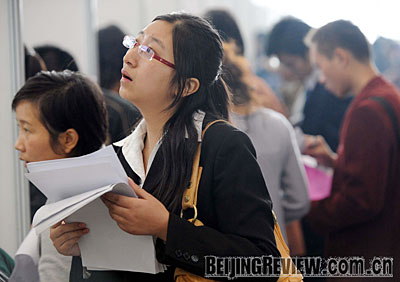|
 |
|
PAUSE FOR THOUGHT: A student stops to look at a company's stand at a job fair in Jiangsu Province (SUN SHEN) |
In Shanghai, salary expectations for a college graduate have dropped from 3,500 yuan ($512) to about 2,000 yuan ($293) a month, while for postgraduates thy have fallen to 3,500 yuan ($512) from an average of 5,000 yuan ($731) in previous years.
"College graduates should get off their high horses and pay more attention to industries that can boost China's domestic demand. They should demonstrate their value by participating in the country's efforts to stimulate the economy," said Sun
Latest statistics indicate that China's agricultural, rail and oil industries are looking to hire. Sun suggests graduates take swift action to land their first job before the crisis becomes more severe.
Considering the difficult job market this year, an increased number of students have opted to study abroad.
Zhang Faqiang, a finance graduate from Peking University, has already applied for seven universities in different countries and received three offers. "Going abroad at this time could both widen my view and help me avoid the financial crisis. I think it is a good choice for me," he said.
Quite a fraction of students have turned to the postgraduate entrance exam to ease their tension. Liu Zhaoyang, a student from Lanzhou University, Gansu Province, said since the hope of finding an ideal job this year is dim, he has spent most of his time preparing for the postgraduate entrance exam. He also revealed that since students have to pay about 10,000 yuan ($1,462) every year for postgraduate education, it is a burden for his family.
Government measures
On December 20, Chinese Premier Wen Jiabao made a surprise visit to Beijing University of Aeronautics and Astronautics, where he pledged to university students that the government would seek to provide more jobs for graduates and "put the issue of graduate employment first."
The employment situation could get even tougher in 2009 as there will be about 6.1 million seeking jobs, according to a report from the Chinese Academy of Social Sciences.
The unemployment rate among new graduates is expected to reach 15 percent in China this year--the highest since the government started to let gaduates choose their own career path in the 1990s. The number of graduates in China has tripled in the last 10 years, increasing from 1.8 million to 6 million this summer, but with the onset of the financial crisis, many will be unable to find the jobs they want.
"The situation facing graduates is becoming alarming," said Tang Xiaolin, a graduate adviser at Fudan University. "Many sectors are suffering from this crisis. Aside for the overload of graduates, many young Chinese who went abroad to study cannot find employment in the U.S. or Europe and have to return to China."
In west China, local governments have taken positive steps to attract graduates. On December 27, 2008, the government of Inner Mongolia Autonomous Region led a team of companies and enterprises from the region to Beijing with over 2,100 positions available, half of them for university graduates.
"The employment situation is a chance for Inner Mongolia since it was more difficult for us to employ college graduates in previous years. This time we are here with more preferential policies, including offering a 50,000-yuan ($7,312) once-off housing subsidy for postgraduates," said Liu Zhuozhi, Vice Chairman of Inner Mongolia Autonomous Region. "We have many projects to start, now what we need most is just talented people."
At the Inner Mongolia job fair in Beijing, 2,217 graduates reached initial agreements with companies and more than 200 signed contracts.
The State Council held a meeting on January 7 on the issue of employment for university graduates. Premier Wen presided over the meeting, which decided to adopt seven measures to promote the employment of graduates.
Graduates who choose to work in villages and communities will get subsidies and social insurance. Those who want to start a business will be offered favorable tax and loan policies. The meeting also ruled that universities should improve their job placement services by providing free information and helping graduates find jobs and that a mechanism to assist university graduates from poor families.
Seven Measures of the State Council to Deal With Graduate Employment
1) Encouraging and guiding graduates to work in rural areas
2) Encouraging graduates to work for medium-sized or small enterprises, or private companies.
3) Encouraging pillar companies and science projects to accept more graduates
4) Encouraging and supporting graduates to start their own business
5) Strengthening employment services for graduates
6) Lifting the ability of graduates for employment
7) Establishing an aid system for graduates from poor families.
(Source: Xinhua News Agency) | 